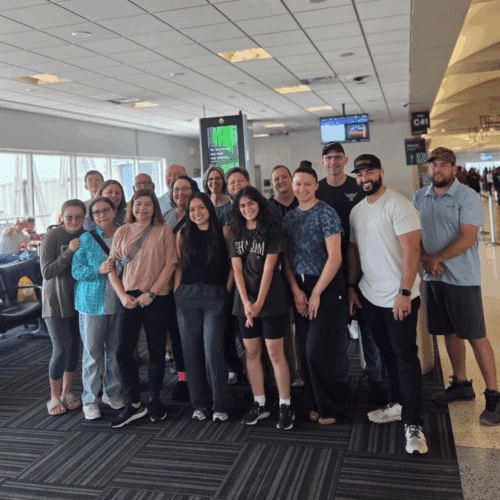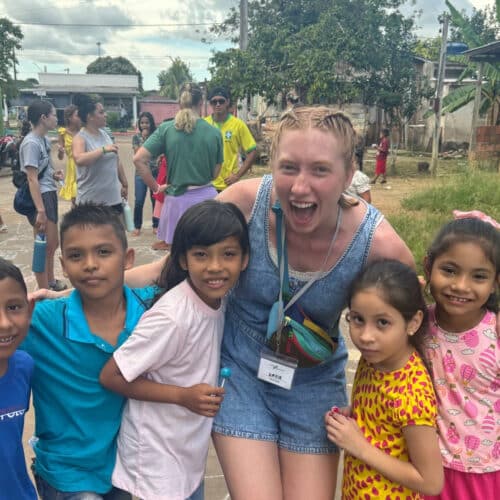One of the more interesting afternoons we spent in the Amazon jungle was among the Tareano tribe. The Tareano are a primitive tribe of five families who have recently come to know Christ and who have experienced hard times in recent years.
After entertaining us with three cultural dances and serving up a delicious baked alligator and their version of tortillas, we had the opportunity to give them illustrated Bibles and talk with them through a translator. I was particularly interested in their rites of passage from childhood to adulthood and the chief’s widow was eager to share the process with us.
The rite for boys begins at age 15. The boy is taken into the jungle and left on his own for a week with only bread and water. At the conclusion of the week, the boy’s father comes to him and teaches him everything he needs to know to be a man.
For girls, the passage begins with menses. She is also taken into the jungle to live on her own, but for an entire month. Her mother will visit her every day with bread and water and instructs her in what it means to be a woman and mother.
A son who is in line to be chief has the most difficult rite of all. He must survive deep in the jungle by himself for a month and a half on bread and water. After that time, the tribal shaman will come to him and teach him everything he needs to know about being chief.
Having spent about an hour in the jungle at night on a hunt (and that in a group of people), I can tell you that being alone in the dark all night in that environment is foreboding. But that’s not the end of it for a chief. Over the course of their lives, they are expected to undergo another ritual of sticking their arm or leg into one of the Amazon’s large and deep ant piles and keep it there until the tribe completes six songs…and they must undergo this task 20 times over the course of their lives…and they must do so without crying! Not surprisingly, many young men will become feverish and pass out from the venom of the ant bites or the pain itself.
Our culture has pretty much rejected the notion that men shouldn’t cry in favor of developing a more “sensitive”, expressive male prototype. That model may, or may not work well on main street USA, but it is not as adaptable for those who live in a threatening environment. (You won’t find many sensitive marine drill instructors for the very same reason)!
Similarly interesting comparisons can be drawn between overprotecting young people and placing them in situations where they are forced to overcome their worst fears, deal with extreme pain and survive on their own. Compare sticking your arm in an ant pile for about 30 minutes with attending a high school graduation ceremony. Compare living by yourself in the dark among prowling snakes and jaguars with getting the keys to your own car.
The obvious reality is that we have eliminated all fear and suffering from our children’s rites of passage and turned them into celebrations. That sounds great on the surface, but I wonder what we’ve lost in the exchange? What have our kids lost? Perhaps the confidence that they can endure hardship…the foundational knowledge that they have the intestinal fortitude to take what life throws at them and not wither when things get dicey.
And how do these rites of passage affect parents? In the U.S., all the anxiety of handing keys over to a teenager rests on the parent. It is not a shared suffering if your kid feels invincible while you lose sleep at night. In the jungle, those long anxious moments are mutual!
There is also a lesson here about life in the tribe of God.
You’ve heard (and perhaps struggled yourself with) the classical old atheistic existentialist question, “How can a good, merciful God allow people to suffer?” I think the Tareanos have given me a better handle on that question than I ever got in Seminary.
I’ve come to believe, perhaps a little too late in life, that there is eternal value in shared suffering. If suffering is avoided and not shared, the repercussions and baggage of it all will be carried into your child’s future like a radioactive albatross around his or her neck, slowly seeping its poison into decisions, relationships and character itself. A part of protecting children, then, is exposing them to, and interpreting for them, just enough of life’s responsibilities and hurts to understand that crying is a reaction, but not a solution.
In point of fact then, how could a good and merciful God not allow His people to suffer? Paul knew as much: “I want to know Christ and the power of his resurrection and the fellowship of his sufferings…” Philippians 3:10a
That’s good jungle wisdom, wherever your jungle happens to be!




 304 44th Ave. N
304 44th Ave. N